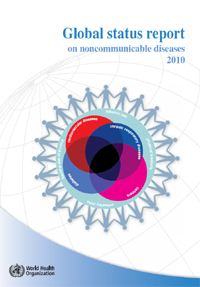The WHO’s recently released Global Status Report on Noncommunicable Diseases 2010 leaves no doubt that chronic diseases are now the number one cause of human suffering, illness, and death.
Of the 57 million global deaths in 2008, 36 million, or 63% were due to noncommunicable diseases (NCDs), principally cardiovascular diseases, diabetes, cancers and chronic respiratory diseases. As the impact of NCDs increases, and as populations age, annual NCD deaths are projected to continue to rise worldwide, and the greatest increase is expected to be seen in low- and middle-income regions.

Chronic disease accounts for 70% of all deaths in the United States and is the main driver of our uncontrolled health care costs. We clearly need new, innovative, and more effective strategies for the prevention and intervention of chronic diseases that are financially sustainable. Our current approach is clearly NOT WORKING WELL ENOUGH and the U.S. needs a dramatic rethink of how best to design a health system to meet this huge and growing challenge. Results from programs like HQP’s Community-based Advanced Care Management indicate that we could make a lot of headway by more aggressively investing in the applied research and development needed to really learn what innovations are effective in addressing this enormous and growing challenge; and then relentlessly refine and improve upon them with an unwavering constancy of purpose.
